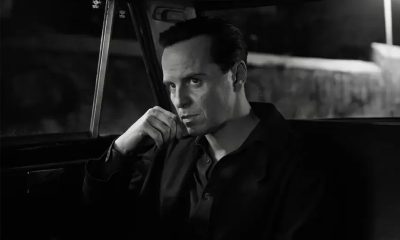a&e features
Golden Globes announces diverse slate of nominees
But is it diverse enough to quell controversy?
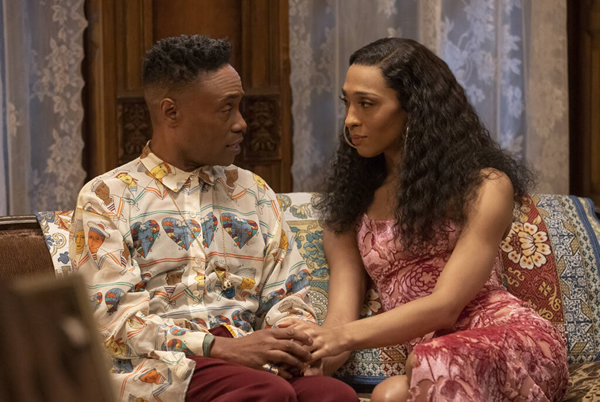
HOLLYWOOD – If any doubt remained that the Hollywood Foreign Press Association has fallen spectacularly out of favor, it was summarily erased by the fact that the sole celebrity on hand to help announce the list of nominations for its 2021 Golden Globe Awards was Snoop Dogg.
That’s not a dig against Snoop Dogg. The eminently lovable rapper is an icon who manages to float effortlessly between worlds within the entertainment industry, thanks to a reputation for enthusiastic self-parody and a proven tendency to be pretty much game for anything – and frankly, watching him read the service manual for a vintage sewing machine would likely be more entertaining than sitting through a list of award nominees being recited (with perfunctory reverence, of course) by even the most accomplished of screen thespians.
Still, the glaring absence of any representative from the industry which the HFPA exists to honor is proof that the organization is still a long way from recovering from the scandal that broke in the wake of a Los Angeles Times investigative report earlier this year, which revealed that its nearly 90-person membership included no people of color and provided damning details about its long-alleged unethical practices – including the influence over its voting process by gifts, paid travel, and other perks from studios and networks behind the potential nominees and winners.
The bombshell report, which was published mere days before the Golden Globes presentation last February, led to an embarrassing award show in which the revelation of the winners was eclipsed by the organization’s scramble to do damage control.
Leaning into a too-little-too-late show of diversity among the ceremony’s performers and presenters, and sending some of the HFPA’s high-level representatives to the podium in a desperate effort to spin the situation with a not-quite-apology for its previous shortcomings (followed by an unconvincing promise to do better), the organization seemed only to have dug itself deeper into the hole of bad publicity that threatened to put an end to the awards body’s 78-year existence, once and for all.
Proposed reforms to the structure and practices of the HFPA were announced, and were promptly dismissed by Time’s Up as “window-dressing platitudes.” Major players in the industry announced intentions to boycott the Golden Globes; more than a hundred PR firms threatened to cut off the HFPA from access to their clients; high-profile talent publicly denounced the organization, with three-time winner Tom Cruise even returning his trophies. Perhaps most disastrous of all, NBC – the network which had been home to the Golden Globes broadcast – announced it would not be airing another one until at least 2023, saying that “change of this magnitude takes time and work” and that “the HFPA needs time to do it right”.
Despite all this, the beleaguered organization declared its intention to continue with its annual awards presentation, and following months of restructuring – in which the HFPA has attempted to diversify its ranks by adding new members, rewritten its bylaws, forbidden the acceptance of gifts, restricted compensated travel, and undertaken an effort to revamp itself from bottom to top – has tenaciously clung to relevance by announcing the nominees for this year’s crop of films and television shows in an early morning press conference marked by the non-participation of any of the potential recipients of those honors.
This means, of course, that it’s time to start gearing up for another awards season in which the dramatic changes wrought by the Covid pandemic upon the entertainment industry are sure to have a still-unpredictable effect on the outcomes, and to engage in a game of “armchair quarterbacking” as we attempt to predict how the honors bestowed by other awards bodies will impact the winners’ circle for the most coveted industry prize of all: the Oscars.
Traditionally, the Golden Globes have been seen as a bellwether for Academy Award inclusion, with many of the nominees and winners going on to eventual Oscar glory – but given the current still-ongoing boycott of the HFPA by so many of the industry’s most influential power-players, it remains to be seen if that long-standing assumption will hold true this year.
With that in mind, it’s worth taking a look at the nominees – with an eye to the diversity among the choices, particularly the inclusion of LGBTQ-relevant nominees among the contenders.
For television, Black actors Billy Porter (“Pose”) and Omar Sy (“Lupin”), as well as South Korean actor Lee Jung-jae (“Squid Game”), received nominations as Best Lead Actor in a Drama Series, while the equivalent Lead Actress category included Black actress Uzo Aduba (“In Treatment”) and Black/Puerto Rican actress Michaela Jaé Rodriguez (“Pose”) – who also makes history by becoming the first transgender performer to be nominated in this category, a feat she also accomplished at the 2021 Emmys. In the Comedy division, Black actor Anthony Anderson (“Black-ish”) picked up a nod as Best Lead Actor, with Black actresses Issa Rae (“Insecure”) and Tracee Ellis Ross (“Black-ish”) included among the nominees for Best Lead Actress.
In the supporting categories (which are not divided into comedy and drama division), O Yeong-su (“Squid Game”) got a nod for Best Supporting Actor, with no nominees of color named within the Supporting Actress slate.
For performances in a Limited Series, Anthology Series, or Motion Picture Made for Television, Latino actor Oscar Isaac (“Scenes From a Marriage”) and French-Algerian actor Tahar Rahim (“The Serpent”) made the cut for Best Actor, while Black actress Cynthia Erivo (“Genius: Aretha”) was nominated for Best Actress.
The big screen acting categories also included several nominees of color. Though there were no performers of color in the running for Best Lead Actress in a Motion Picture Drama, the Lead Actor slate includes three Black actors – Mahershala Ali (“Swan Song”), Will Smith (“King Richard”), and Denzel Washington (“The Tragedy of Macbeth”) – among its contenders. In the Musical or Comedy division, Latino actor Anthony Ramos (“In the Heights”) scored a nomination for Lead Actor, with Latino/Polish newcomer Rachel Zegler (“West Side Story”) earning a nod for Lead Actress.
In the Supporting categories (which again, are not separated into Drama and Comedy divisions), Black performers Aunjanue Ellis (“King Richard”) and Ruth Negga (“Passing”) joined Black/Puerto Rican performer Ariana DeBose (“West Side Story”) on the list of Actress nominees, and while the Actor category contained no performers of color, deaf actor Troy Kotsur (“CODA”) made the cut, in a rare show of representation for people with disabilities.
When it comes to LGBTQ representation, however, the nominations fall considerably shorter. Among all the acting nominees, the only out members of the community are Porter and Rodriguez (each in their respective Lead Performance categories for “Pose”), Kristen Stewart (“Spencer”) and Lady Gaga (“House of Gucci”) for Lead Actress in a Motion Picture Drama, and Hannah Einbender (“Hacks”) for Best Performance by a Lead Actress in a Television Comedy. In addition to these, Udo Azuba (nominated for Best Lead Actress in a Television Drama for“In Treatment”), Andrew Garfield (nominated for Best Lead Actor in a Motion Picture Musical or Comedy for “tick, tick… Boom!”) and Erivo are noted for their vocal LGBTQ advocacy as allies.
While nominees Benedict Cumberbatch and Kodi Smit-McPhee (nominated for Lead and Supporting Actor, respectively, in a Motion Picture Drama for “The Power of the Dog”) play queer characters, both identify as straight in real life. The same is true for Ewan McGregor, nominated as Best Actor in a Limited Series for his star turn as the title character in “Halston”.
Finally, it’s worth mentioning that the Best Director of a Motion Picture category, long dominated exclusively by men, this year includes two women: Jane Campion (“The Power of the Dog”) and Maggie Gyllenhall (“The Lost Daughter”)
Whether or not these nominees – or any of the others, for that matter – end up following up their recognition today with nods or wins on Oscar night remains to be seen. In the meantime, we can find out who takes home the HFPA’s prizes (as well as who actually shows up to claim a prize from an organization now relegated to pariah status by most of Hollywood) on January 9, when the ceremony can be seen on the Golden Globes’ You Tube channel.
A complete list of nominations is below.
Best Television Series, Musical or Comedy
“The Great” (Hulu)
“Hacks” (HBO/HBO Max)
“Only Murders in the Building” (Hulu)
“Reservation Dogs” (FX on Hulu)
“Ted Lasso” (Apple TV Plus)
Best Performance by an Actor in a Television Series, Drama
Brian Cox (“Succession”)
Lee Jung-jae (“Squid Game”)
Billy Porter (“Pose”)
Jeremy Strong (“Succession”)
Omar Sy (“Lupin)
Best Performance by an Actress, Limited Series, Anthology Series or a Motion Picture made for Television
Jessica Chastain (“Scenes From a Marriage”)
Cynthia Erivo (“Genius: Aretha”)
Elizabeth Olsen (“WandaVision“)
Margaret Qualley (“Maid”)
Kate Winslet (“Mare of Easttown”)
Best Director, Motion Picture
Kenneth Branagh (“Belfast”)
Jane Campion (“The Power of the Dog”)
Maggie Gyllenhaal (“The Lost Daughter”)
Steven Spielberg (“West Side Story”)
Denis Villeneuve (“Dune”)
Best Performance by an Actress in a Motion Picture, Musical or Comedy
Marion Cotillard (“Annette”)
Alana Haim (“Licorice Pizza”)
Jennifer Lawrence (“Don’t Look Up”)
Emma Stone (“Cruella”)
Rachel Zegler (“West Side Story”)
Best Performance by an Actor in a Motion Picture, Drama
Mahershala Ali (“Swan Song”)
Javier Bardem (“Being the Ricardos”)
Benedict Cumberbatch (“The Power of the Dog”)
Will Smith (“King Richard”)
Denzel Washington (“The Tragedy of Macbeth”)
Best Television Series, Drama
“Lupin” (Netflix)
“The Morning Show” (Apple TV Plus)
“Pose” (FX)
“Squid Game” (Netflix)
“Succession” (HBO/HBO Max)
Best Performance by an Actress in a Television Series, Drama
Uzo Aduba (“In Treatment”)
Jennifer Aniston (“The Morning Show”)
Christine Baranski (“The Good Fight)
Elisabeth Moss (“The Handmaid’s Tale”)
Michaela Jaé Rodriguez (“Pose”)
Best Performance by an Actor, Limited Series, Anthology Series or Motion Picture made for Television
Paul Bettany (“WandaVision”)
Oscar Isaac (“Scenes From a Marriage”)
Michael Keaton (“Dopesick”)
Ewan McGregor (“Halston”)
Tahar Rahim (“The Serpent”)
Best Performance by an Actor in a Motion Picture, Musical or Comedy
Leonardo DiCaprio (“Don’t Look Up”)
Peter Dinklage (“Cyrano”)
Andrew Garfield (“Tick, Tick … Boom!”)
Cooper Hoffman (“Licorice Pizza”)
Anthony Ramos (“In the Heights”)
Best Supporting Actor – Motion Picture
Ben Affleck (“The Tender Bar”)
Jamie Dornan (“Belfast”)
Ciarán Hinds (“Belfast”)
Troy Kotsur (“CODA”)
Kodi Smit-McPhee (“The Power of the Dog”)
Best Original Score, Motion Picture
“The French Dispatch” (Searchlight Pictures) — Alexandre Desplat
“Encanto” (Walt Disney Pictures) — Germaine Franco
“The Power of the Dog” (Netflix) — Jonny Greenwood
“Parallel Mothers” (Sony Pictures Classic) — Alberto Iglesias
“Dune” (Warner Bros.) — Hans Zimmer
Best Actress in a TV Series, Musical or Comedy
Hannah Einbinder (“Hacks”)
Elle Fanning (“The Great”)
Issa Rae (“Insecure”)
Tracee Ellis Ross (“Black-ish”)
Jean Smart (“Hacks”)
Best Limited Series, Anthology Series or a Motion Picture made for Television
“Dopesick” (Hulu)
“Impeachment: American Crime Story” (FX)
“Maid” (Netflix)
“Mare of Easttown” (HBO/HBO Max)
“The Underground Railroad” (Amazon Prime Video)
Best Supporting Actor, Television
Billy Crudup (“The Morning Show”)
Kieran Culkin (“Succession”)
Mark Duplass (“The Morning Show”)
Brett Goldstein (“Ted Lasso”)
O Yeong-su (“Squid Game”)
Best Picture, Musical or Comedy
“Cyrano” (MGM)
“Don’t Look Up” (Netflix)
“Licorice Pizza” (MGM)
“Tick, Tick … Boom!” (Netflix)
“West Side Story” (20th Century Studios / Walt Disney Studios Motion Pictures)
Best Supporting Actress, Motion Picture
Caitríona Balfe (“Belfast”)
Ariana DeBose (“West Side Story”)
Kirsten Dunst (“The Power of the Dog”)
Aunjanue Ellis (“King Richard”)
Ruth Negga (“Passing”)
Best Picture, Foreign Language
“Compartment No. 6” (Sony Pictures Classics) — Finland, Russia, Germany
“Drive My Car” (Janus Films) — Japan
“The Hand of God” (Netflix) — Italy
“A Hero” (Amazon Studios) — France, Iran
“Parallel Mothers” (Sony Pictures Classics) — Spain
Best Screenplay, Motion Picture
Paul Thomas Anderson — “Licorice Pizza” (MGM/United Artists Releasing)
Kenneth Branagh — “Belfast” (Focus Features)
Jane Campion — “The Power of the Dog” (Netflix)
Adam McKay — “Don’t Look Up” (Netflix)
Aaron Sorkin — “Being the Ricardos” (Amazon Studios)
Best Performance by an Actress in a Motion Picture, Drama
Jessica Chastain (“The Eyes of Tammy Faye”)
Olivia Colman (“The Lost Daughter”)
Nicole Kidman (“Being the Ricardos”)
Lady Gaga (“House of Gucci”)
Kristen Stewart (“Spencer”)
Best Motion Picture, Drama
“Belfast” (Focus Features)
“CODA” (Apple)
“Dune” (Warner Bros.)
“King Richard” (Warner Bros.)
“The Power of the Dog” (Netflix)
Best Television Actor, Musical / Comedy Series
Anthony Anderson (“Black-ish”)
Nicholas Hoult (“The Great”)
Steve Martin (“Only Murders in the Building”)
Martin Short (“Only Murders in the Building”)
Jason Sudeikis (“Ted Lasso”)
Best Supporting Actress, Television
Jennifer Coolidge (“White Lotus”)
Kaitlyn Dever (“Dopesick”)
Andie MacDowell (“Maid”)
Sarah Snook (“Succession”)
Hannah Waddingham (“Ted Lasso”)
Best Original Song, Motion Picture
“Be Alive” from “King Richard” (Warner Bros.) — Beyoncé Knowles-Carter, Dixson
“Dos Orugitas” from “Encanto” (Walt Disney Pictures) — Lin-Manuel Miranda
“Down to Joy” from “Belfast” (Focus Features) — Van Morrison
“Here I Am (Singing My Way Home)” from “Respect” (MGM/United Artists Releasing) — Jamie Hartman, Jennifer Hudson, Carole King
“No Time to Die” from “No Time to Die” (MGM/United Artists Releasing) — Billie Eilish, Finneas O’Connell
Best Motion Picture, Animated
“Encanto” (Walt Disney Studios Motion Pictures)
“Flee” (Neon)
“Luca” (Walt Disney Studios Motion Pictures)
“My Sunny Maad” (Totem Films)
“Raya and the Last Dragon” (Walt Disney Studios)
a&e features
Eastern Shore chef named James Beard Finalist
Harley Peet creates inventive food in an inclusive space

In a small Eastern Shore town filled with boutiques, galleries, and the occasional cry of waterfowl from the Chesapeake, Chef Harley Peet is most at home. In his Viennese-inflected, Maryland-sourced fine-dining destination Bas Rouge, Peet draws from his Northern Michigan upbringing, Culinary Institute of America education, and identity as a gay man, for inspiration.
And recently, Peet was named a James Beard Finalist for Best Chef: Mid-Atlantic – the first “Best Chef: Mid-Atlantic” finalist representing the Eastern Shore.
Peet, after graduation from the Culinary Institute of America, took a position as sous chef at Tilghman Island Inn, not far from Bas Rouge. Falling in love with the Eastern Shore, he continued his passion for racing sailboats, boating, gardening, and fishing, and living his somewhat pastoral life as he opened Bas Rouge in 2016 as head chef, a restaurant part of the Bluepoint Hospitality group, which runs more than a dozen concepts in and around Easton, Md.
Coming from a rural area and being gay, Peet knew he had his work cut out for him. He was always aware that the service and hospitality industry “can be down and dirty and rough.”
Now as a leader in the kitchen, he aims to “set a good example, and treat people how I want to be treated. I also want to make sure if you’re at our establishment, I’m the first to stand up and say something.”
The Bas Rouge cuisine, he says, is Contemporary European. “I’m inspired by old-world techniques of countries like Austria, Germany, and France, but I love putting a new spin on classic dishes and finding innovative ways to incorporate the bounty of local Chesapeake ingredients.”
His proudest dish: the humble-yet-elevated Wiener Schnitzel. “It is authentic to what one would expect to find in Vienna, down to the Lingonberries.” From his in-house bakery, Peet dries and grinds the housemade Kaiser-Semmel bread to use as the breadcrumbs.
Peet works to support the LGBTQ community inside and outside of the kitchen. “I love that our Bluepoint Hospitality team has created welcoming spaces where our patrons feel comfortable dining at each of our establishments. Our staff have a genuine respect for one another and work together free of judgment.”
Representing Bluepoint, Peet has participated in events like Chefs for Equality with the Human Rights Campaign, advocating for LGBTQ rights.
At Bas Rouge, Peet brings together his passion for inclusion steeped in a sustainability ethic. He sees environmental stewardship as a way of life. Peet and his husband have lived and worked on their own organic farm for several years. Through research in Europe, he learned about international marine sourcing. Witnessing the impacts of overfishing, Peet considers his own role in promoting eco-friendly practices at Bas Rouge. To that end, he ensures responsible sourcing commitments through his purveyors, relationships that have helped create significant change in how people dine in Easton.
“I have built great relationships in the community and there’s nothing better than one of our long-standing purveyors stopping in with a cooler of fresh fish from the Chesapeake Bay. This goes especially for catching and plating the invasive blue catfish species, which helps control the species’ threat to the local ecosystem.
Through his kitchen exploits, Peet expressed a unique connection to another gay icon in a rural fine-dining restaurant: Patrick O’Connell, of three Michelin starred Inn at Little Washington. In fact, Peet’s husband helped design some of O’Connell’s kitchen spaces. They’ve both been able to navigate treacherous restaurant-industry waters, and have come out triumphant and celebrated. Of O’Connell, Peet says that he “sees [his restaurants] as canvas, all artistry, he sees this as every night is a show.” But at the same time, his “judgment-free space makes him a role model.”
Being in Easton itself is not without challenges. Sourcing is a challenge, having to either fly or ship in ingredients, whereas urban restaurants have the benefit of trucking, he says. The small town “is romantic and charming,” but logistics are difficult – one of the reasons that Peet ensures his team is diverse, building in different viewpoints, and also “making things a hell of a lot more fun.”
Reflecting on challenges and finding (and creating) space on the Eastern Shore, Peet confirmed how important it was to surround himself with people who set a good example, and “if you don’t like the way something is going, fuck them and move on.”
a&e features
What to expect at the 2024 National Cannabis Festival
Wu-Tang Clan to perform; policy discussions also planned

(Editor’s note: Tickets are still available for the National Cannabis Festival, with prices starting at $55 for one-day general admission on Friday through $190 for a two-day pass with early-entry access. The Washington Blade, one of the event’s sponsors, will host a LGBTQIA+ Lounge and moderate a panel discussion on Saturday with the Mayor’s Office of LGBTQ Affairs.)
With two full days of events and programs along with performances by Wu-Tang Clan, Redman, and Thundercat, the 2024 National Cannabis Festival will be bigger than ever this year.
Leading up to the festivities on Friday and Saturday at Washington, D.C.’s RFK Stadium are plenty of can’t-miss experiences planned for 420 Week, including the National Cannabis Policy Summit and an LGBTQ happy hour hosted by the District’s Black-owned queer bar, Thurst Lounge (both happening on Wednesday).
On Tuesday, the Blade caught up with NCF Founder and Executive Producer Caroline Phillips, principal at The High Street PR & Events, for a discussion about the event’s history and the pivotal political moment for cannabis legalization and drug policy reform both locally and nationally. Phillips also shared her thoughts about the role of LGBTQ activists in these movements and the through-line connecting issues of freedom and bodily autonomy.
After D.C. residents voted to approve Initiative 71 in the fall of 2014, she said, adults were permitted to share cannabis and grow the plant at home, while possession was decriminalized with the hope and expectation that fewer people would be incarcerated.
“When that happened, there was also an influx of really high-priced conferences that promised to connect people to big business opportunities so they could make millions in what they were calling the ‘green rush,'” Phillips said.
“At the time, I was working for Human Rights First,” a nonprofit that was, and is, engaged in “a lot of issues to do with world refugees and immigration in the United States” — so, “it was really interesting to me to see the overlap between drug policy reform and some of these other issues that I was working on,” Phillips said.
“And then it rubbed me a little bit the wrong way to hear about the ‘green rush’ before we’d heard about criminal justice reform around cannabis and before we’d heard about people being let out of jail for cannabis offenses.”
“As my interests grew, I realized that there was really a need for this conversation to happen in a larger way that allowed the larger community, the broader community, to learn about not just cannabis legalization, but to understand how it connects to our criminal justice system, to understand how it can really stimulate and benefit our economy, and to understand how it can become a wellness tool for so many people,” Phillips said.
“On top of all of that, as a minority in the cannabis space, it was important to me that this event and my work in the cannabis industry really amplified how we could create space for Black and Brown people to be stakeholders in this economy in a meaningful way.”

“Since I was already working in event production, I decided to use those skills and apply them to creating a cannabis event,” she said. “And in order to create an event that I thought could really give back to our community with ticket prices low enough for people to actually be able to attend, I thought a large-scale event would be good — and thus was born the cannabis festival.”
D.C. to see more regulated cannabis businesses ‘very soon’
Phillips said she believes decriminalization in D.C. has decreased the number of cannabis-related arrests in the city, but she noted arrests have, nevertheless, continued to disproportionately impact Black and Brown people.
“We’re at a really interesting crossroads for our city and for our cannabis community,” she said. In the eight years since Initiative 71 was passed, “We’ve had our licensed regulated cannabis dispensaries and cultivators who’ve been existing in a very red tape-heavy environment, a very tax heavy environment, and then we have the unregulated cannabis cultivators and cannabis dispensaries in the city” who operate via a “loophole” in the law “that allows the sharing of cannabis between adults who are over the age of 21.”
Many of the purveyors in the latter group, Phillips said, “are looking at trying to get into the legal space; so they’re trying to become regulated businesses in Washington, D.C.”
She noted the city will be “releasing 30 or so licenses in the next couple of weeks, and those stores should be coming online very soon” which will mean “you’ll be seeing a lot more of the regulated stores popping up in neighborhoods and hopefully a lot more opportunity for folks that are interested in leaving the unregulated space to be able to join the regulated marketplace.”
National push for de-scheduling cannabis
Signaling the political momentum for reforming cannabis and criminal justice laws, Wednesday’s Policy Summit will feature U.S. Sens. Raphael Warnock (D-Ga.), Jeff Merkley (D-Ore.), Elizabeth Warren (D-Mass.), and Chuck Schumer (D-N.Y.), the Senate majority leader.
Also representing Capitol Hill at the Summit will be U.S. Congresswoman Eleanor Holmes Norton (D-D.C.) and U.S. Reps. Earl Blumenauer (D-Ore.) and Barbara Lee (D-Calif.) — who will be receiving the Supernova Women Cannabis Champion Lifetime Achievement Award — along with an aide to U.S. Rep. David Joyce (R-Ohio).
Nationally, Phillips said much of the conversation around cannabis concerns de-scheduling. Even though 40 states and D.C. have legalized the drug for recreational and/or medical use, marijuana has been classified as a Schedule I substance since the Controlled Substances Act was passed in 1971, which means it carries the heftiest restrictions on, and penalties for, its possession, sale, distribution, and cultivation.
The U.S. Department of Health and Human Services formally requested the drug be reclassified as a Schedule III substance in August, which inaugurated an ongoing review, and in January a group of 12 Senate Democrats sent a letter to the Biden-Harris administration’s Drug Enforcement Administration urging the agency to de-schedule cannabis altogether.
Along with the Summit, Phillips noted that “a large contingent of advocates will be coming to Washington, D.C. this week to host a vigil at the White House and to be at the festival educating people” about these issues. She said NCF is working with the 420 Unity Coalition to push Congress and the Biden-Harris administration to “move straight to de-scheduling cannabis.”
“This would allow folks who have been locked up for cannabis offenses the chance to be released,” she said. “It would also allow medical patients greater access. It would also allow business owners the chance to exist without the specter of the federal government coming in and telling them what they’re doing is wrong and that they’re criminals.”
Phillips added, however, that de-scheduling cannabis will not “suddenly erase” the “generations and generations of systemic racism” in America’s financial institutions, business marketplace, and criminal justice system, nor the consequences that has wrought on Black and Brown communities.
An example of the work that remains, she said, is making sure “that all people are treated fairly by financial institutions so that they can get the funding for their businesses” to, hopefully, create not just another industry, but “really a better industry” that from the outset is focused on “equity” and “access.”
Policy wonks should be sure to visit the festival, too. “We have a really terrific lineup in our policy pavilion,” Phillips said. “A lot of our heavy hitters from our advocacy committee will be presenting programming.”
“On Saturday there is a really strong federal marijuana reform panel that is being led by Maritza Perez Medina from the Drug Policy Alliance,” she said. “So that’s going to be a terrific discussion” that will also feature “representation from the Veterans Cannabis Coalition.”
“We also have a really interesting talk being led by the Law Enforcement Action Partnership about conservatives, cops, and cannabis,” Phillips added.
Cannabis and the LGBTQ community
“I think what’s so interesting about LGBTQIA+ culture and the cannabis community are the parallels that we’ve seen in the movements towards legalization,” Phillips said.
The fight for LGBTQ rights over the years has often involved centering personal stories and personal experiences, she said. “And that really, I think, began to resonate, the more that we talked about it openly in society; the more it was something that we started to see on television; the more it became a topic in youth development and making sure that we’re raising healthy children.”
Likewise, Phillips said, “we’ve seen cannabis become more of a conversation in mainstream culture. We’ve heard the stories of people who’ve had veterans in their families that have used cannabis instead of pharmaceuticals, the friends or family members who’ve had cancer that have turned to CBD or THC so they could sleep, so they could eat so they could get some level of relief.”
Stories about cannabis have also included accounts of folks who were “arrested when they were young” or “the family member who’s still locked up,” she said, just as stories about LGBTQ people have often involved unjust and unnecessary suffering.
Not only are there similarities in the socio-political struggles, Phillips said, but LGBTQ people have played a central role pushing for cannabis legalization and, in fact, in ushering in the movement by “advocating for HIV patients in California to be able to access cannabis’s medicine.”
As a result of the queer community’s involvement, she said, “the foundation of cannabis legalization is truly patient access and criminal justice reform.”
“LGBTQIA+ advocates and cannabis advocates have managed to rein in support of the majority of Americans for the issues that they find important,” Phillips said, even if, unfortunately, other movements for bodily autonomy like those concerning issues of reproductive justice “don’t see that same support.”
a&e features
Juliet Hawkins’s music defies conventional categorization
‘Keep an open mind, an open heart, and a willingness to evolve’
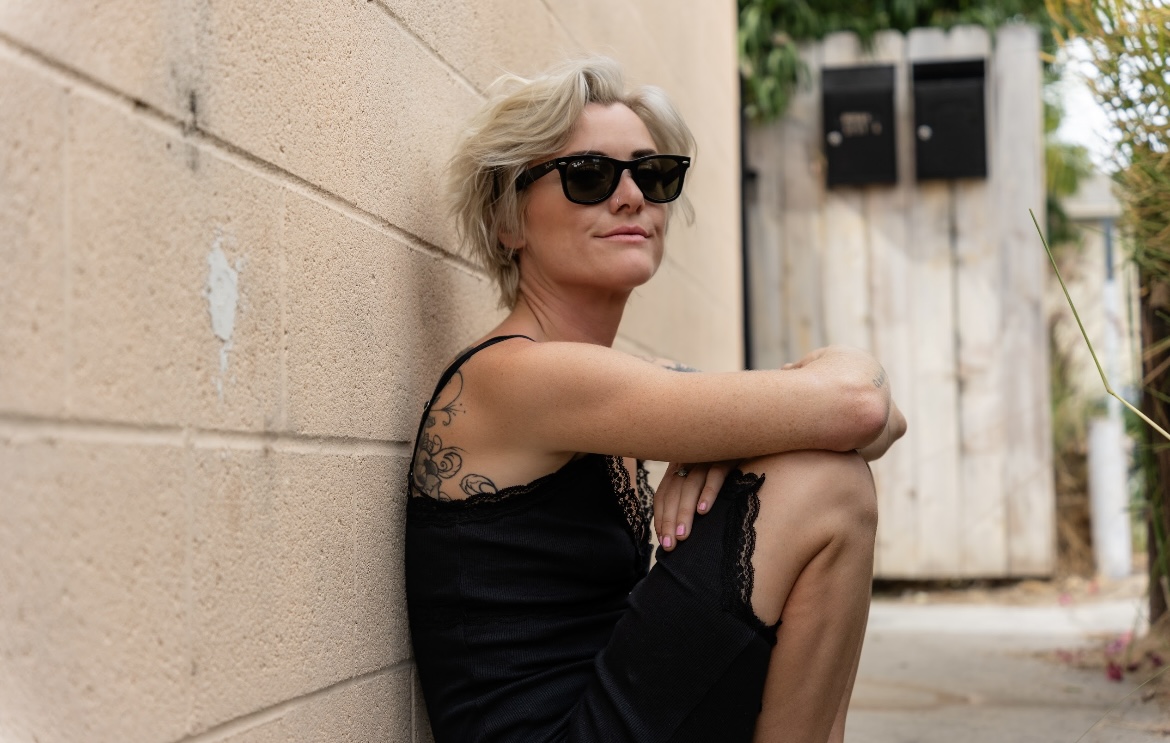
LONG BEACH, Calif. – Emerging from the dynamic music scene of Los Angeles, Juliet Hawkins seamlessly integrates deeply soulful vocals with contemporary production techniques, crafting a distinctive sound that defies conventional categorization.
Drawing inspiration from the emotive depth of Amy Winehouse and weaving together elements of country, blues, and pop, Hawkins’ music can best be described as a fusion–perhaps best termed as soulful electronica. Yet, even this characterization falls short, as Hawkins defines herself as “a blend of a million different inspirations.”
Hawkins’s musical palette mirrors her personae: versatile and eclectic. Any conversation with Hawkins makes this point abundantly clear. She exhibits the archetype of a wild, musical genius while remaining true to her nature-loving, creative spirit. Whether recording in the studio for an album release, performing live in a studio setting, or playing in front of a live audience, Hawkins delivers her music with natural grace.
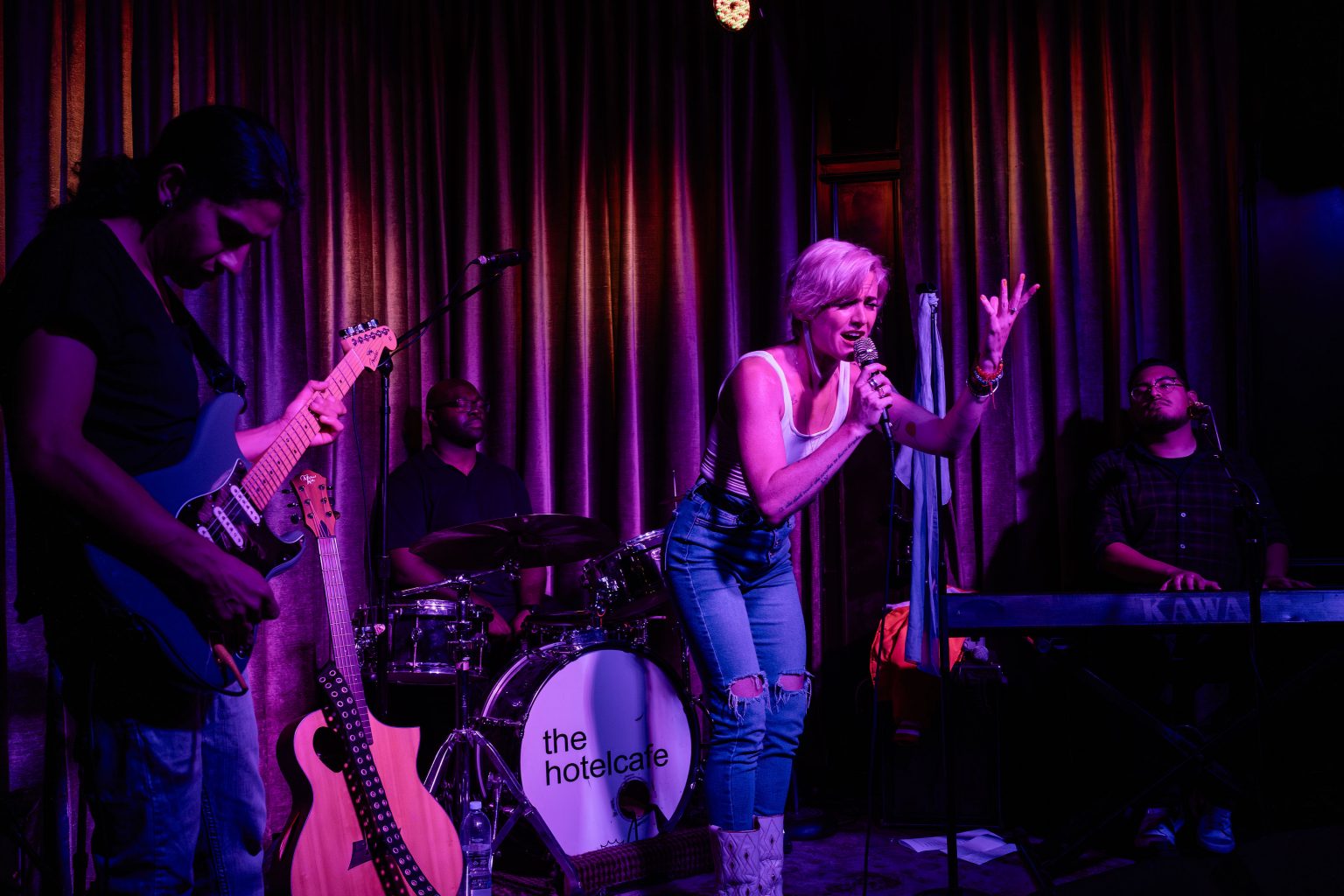
However, Hawkins’s musical journey is far from effortless. Amid personal challenges and adversity, she weaves her personal odyssey of pain and pleasure, transforming these experiences into empowering anthems.
In a candid interview with the Blade, Hawkins spoke with profound openness and vulnerability about her past struggles with opiate and heroin addiction: “That was 10 years ago that I struggled with opiates,” she shared. Yet, instead of letting her previous addiction define her, Hawkins expressed to the Blade that she harbors no shame about her past. “My newer music is much more about empowerment than recovery,” she explained, emphasizing that “writing was the best way to process trauma.”
Despite her struggles with addiction, Hawkins managed to recover. However, she emphasizes that this recovery is deeply intertwined with her spiritual connection to nature. An illustrative instance of Hawkins’ engagement with nature occurred during the COVID pandemic.
Following an impulse that many of us have entertained, she bought a van and chose to live amidst the trees. It was during this period that Hawkins composed the music for her second EP, titled “Lead with Love.”
In many ways, Hawkins deep spiritual connection to nature has been profoundly shaped by her extensive travels. Born in San Diego, spending her formative years in Massachusetts, and later moving to Tennessee before returning to Southern California, she has broadened her interests and exposed herself to the diverse musical landscapes across America.
“Music is the only thing I have left,” Hawkins confides to the Blade, highlighting the integral role that music has in her life. This intimate relationship with music is evident in her sultry and dynamic compositions. Rather than imitating or copying other artists, Hawkins effortlessly integrates sounds from some of her favorite musical influences to create something new. Some of these influences include LP, Lucinda Williams, Lana Del Rey, and, of course, Amy Winehouse, among others.
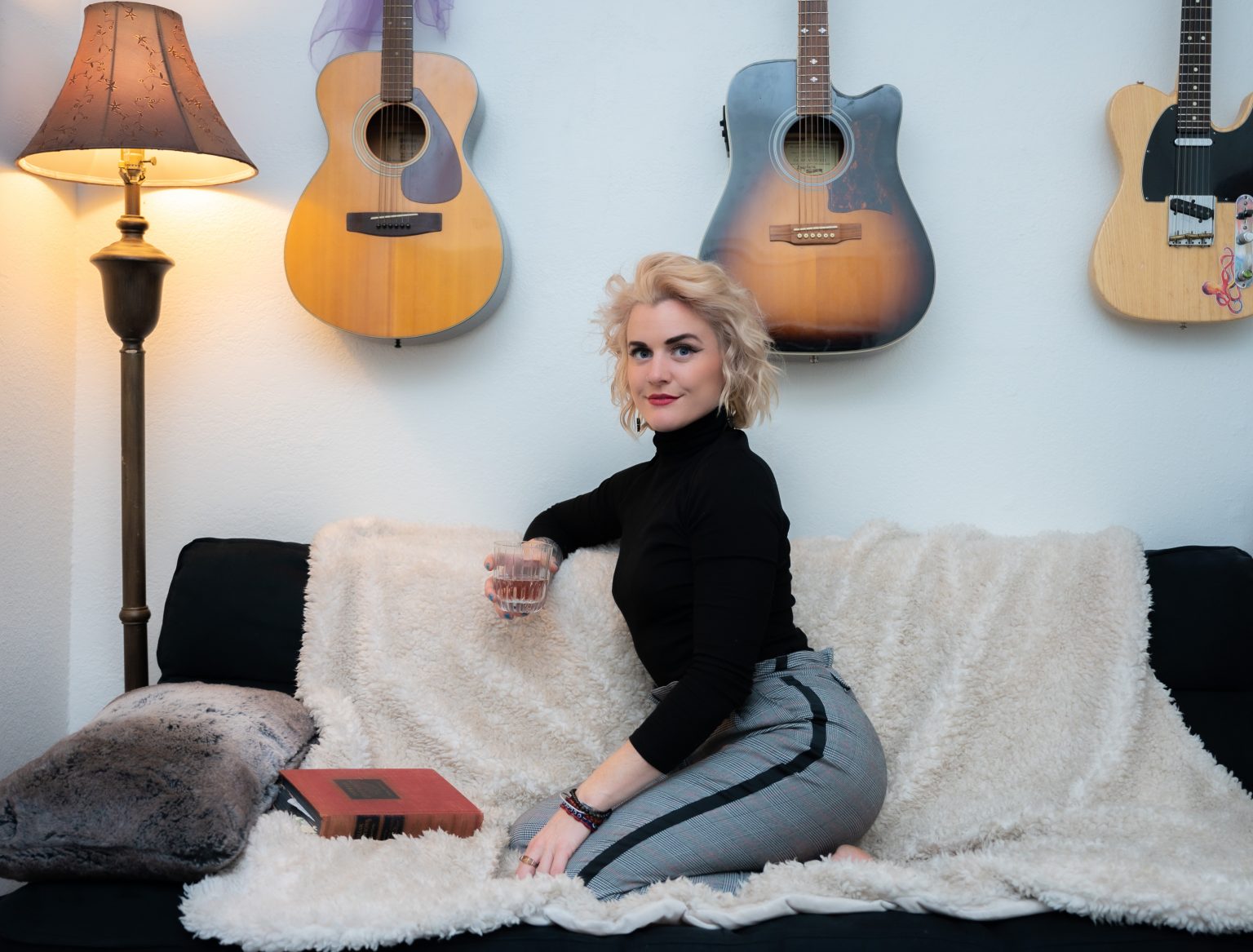
Hawkins has always been passionate about music—-she began with piano at a young age, progressed to guitar, and then to bass, eagerly exploring any instrument she could get her hands on. However, instead of following a traditional path of formalized lessons and structured music theory, Hawkins told the Blade that she “has a hard time following directions and being told what to do.”
This independent approach has led her to experiment with various genres and even join unexpected groups, such as a tribute band for Eric Clapton and Cream. While she acknowledges that her eclectic musical interests might be attributed to ADHD, she holds a different belief: “Creative minds like to move around.”
When discussing her latest musical release — “Stay True (the live album)” which was recorded in a live studio setting — Hawkins describes the experience as a form of improvisation with both herself and the band:
“[The experience] was this divine honey that was flowing through all of us.” She explains that this live album was uncertain in the music’s direction. “For a couple of songs,” Hawkins recalls, “we intuitively closed them out.” By embracing creative spontaneity and refusing to be constrained by fear of mistakes, the live album authentically captures raw sound, complete with background chatter, extended outros, and an extremely somber cover of Ozzy Osbourne’s “Crazy Train” coupled with a slow piano and accompanied strings.
While “Stay True” was a rewarding experience for Hawkins, her favorite live performance took place in an unexpected location—an unattended piano in the middle of an airport. As she began playing Beethoven’s “Moonlight Sonata”, Hawkins shared with the Blade a universal connection we all share with music: “This little girl was dancing as I was playing.”
After the performance, tears welled in Hawkins’ eyes as she was touched by the young girl’s appreciation of her musicianship. Hawkins tells the Blade, “It’s not about playing to an audience—it’s about finding your people.”
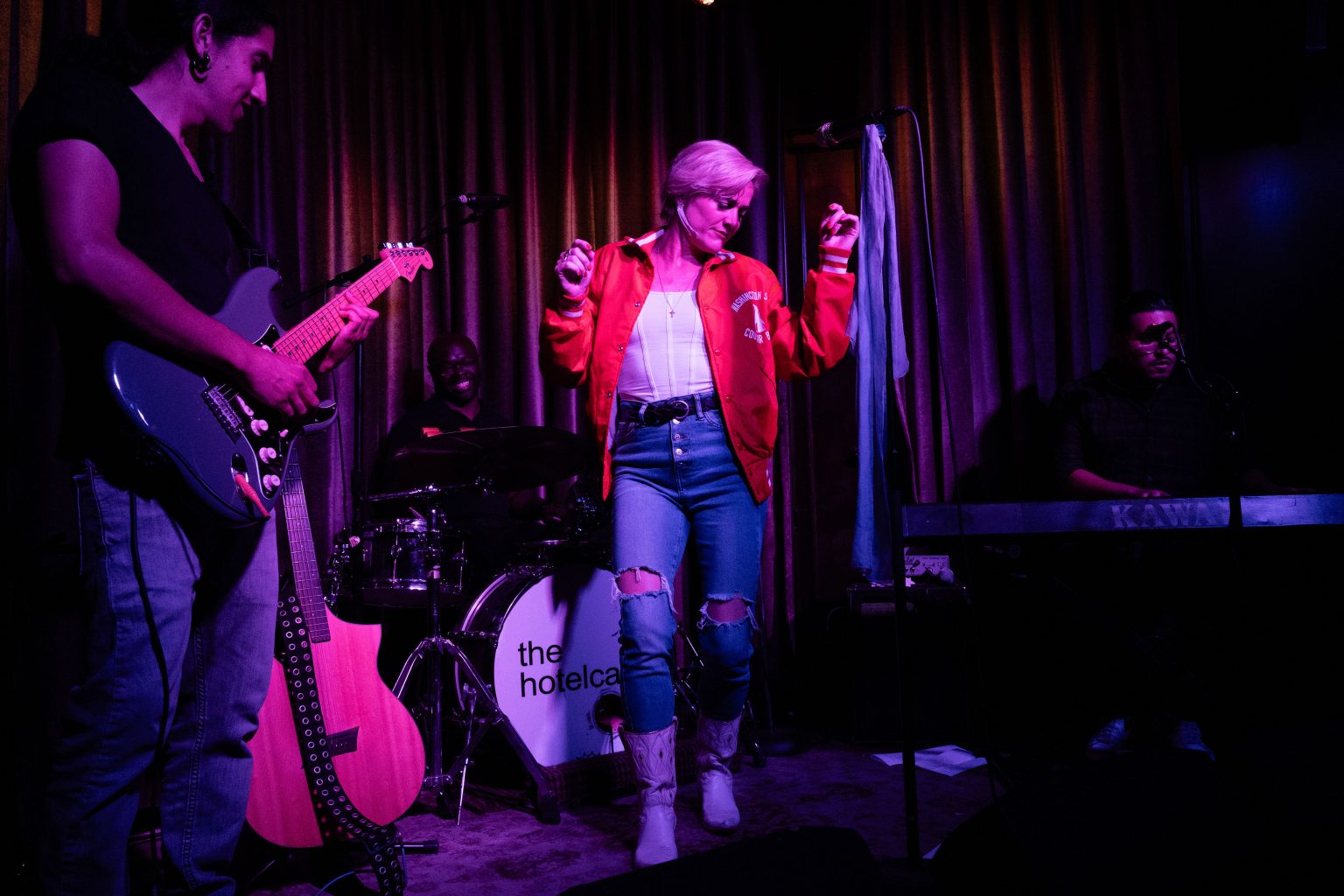
What sets Hawkins apart as an artist is her ability to connect with her audience in diverse settings. She highlights EDC, an electronic dance music festival, as a place where she unabashedly lets her “freak flag” fly and a place to connect with her people. Her affinity for electronic music not only fuels her original pop music creations, but also inspires her to reinterpret songs with an electronic twist. A prime example of this is with her electronic-style cover of Tal Bachman’s 90’s hit, “She’s So High.”
As an openly queer woman in the music industry, Hawkins is on a mission to safeguard artistic integrity. In songs like “My Father’s Men,” she bares her vulnerability and highlights the industry’s misogyny, which often marginalizes gender minorities in their pursuit of artistic expression.
She confides to the Blade, “The industry can be so sexist, misogynist, and oppressive,” and points out that “there are predators in the industry.” Yet, rather than succumbing to apathy, Hawkins is committed to advocating for gender minorities within the music industry.
“Luckily, people are rising up against misogyny, but it’s still there. ‘My Father’s Men’ is a message: It’s time for more people who aren’t just white straight men to have a say.”
Hawkins is also an activist for other causes, with a fervent belief in the preservation of bodily autonomy. Her self-directed music video “I’ll play Daddy,” showcases the joy of embracing one’s body with Hawkins being sensually touched by a plethora of hands. While the song, according to Hawkins, “fell upon deaf ears in the south,” it hasn’t stopped Hawkins from continuing to fight for the causes she believes in. In her interview, Hawkins encapsulated her political stance by quoting an artist she admires:
“To quote Pink, ‘I don’t care about your politics, I care about your kids.’”
When Hawkins isn’t writing music or being a champion for various causes, you might catch her doing the following: camping, rollerblading, painting, teaching music lessons, relaxing with Bernie (her beloved dog), stripping down for artsy photoshoots, or embarking on a quest to find the world’s best hollandaise sauce.
But at the end of the day, Hawkins sums up her main purpose: “To come together with like-minded people and create.”
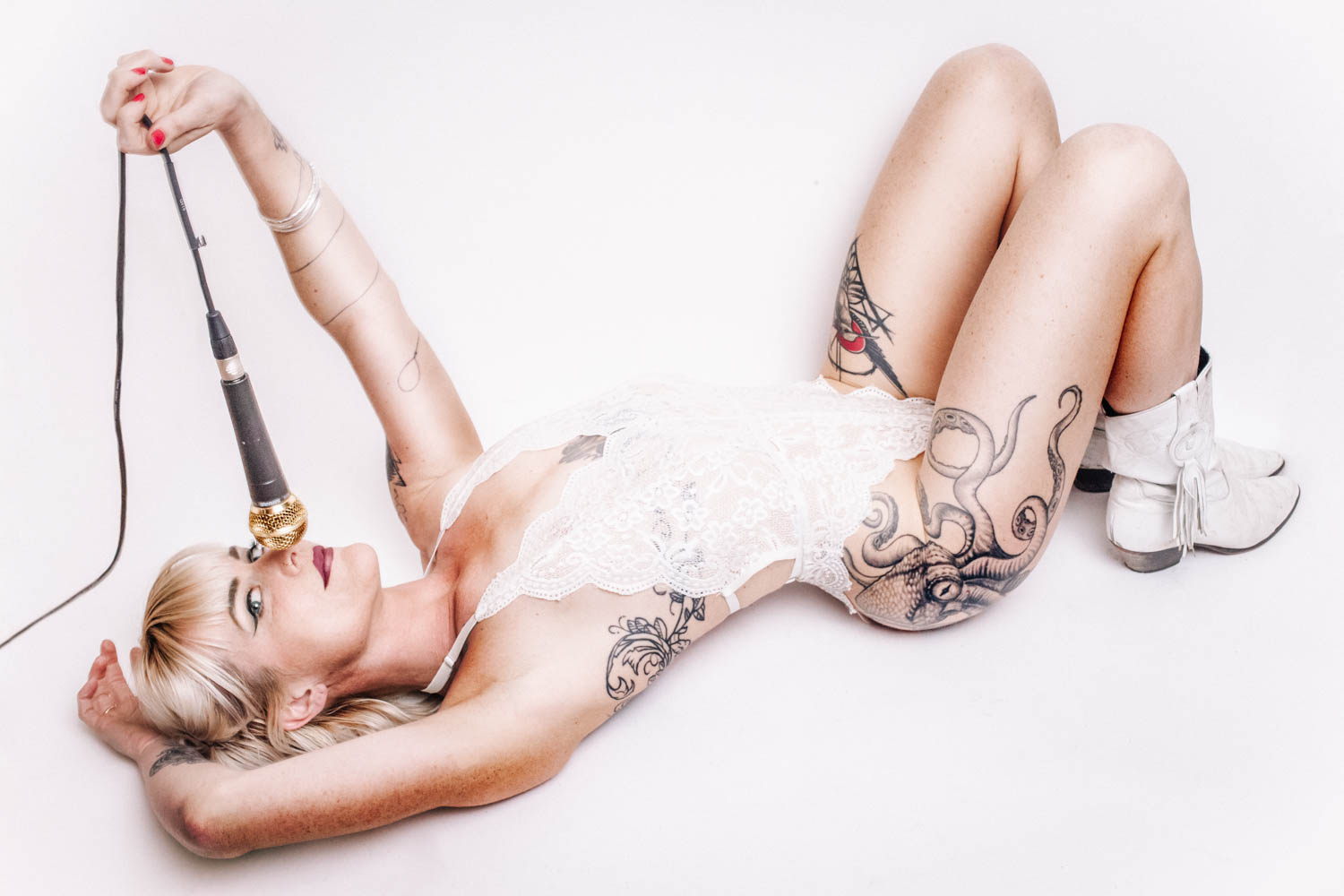
Part of this ever-evolving, coming-of-age-like journey includes an important element: plant-based medicine. Hawkins tells the Blade that she acknowledges her previous experience with addiction and finds certain plants to be useful in her recovery:
“The recovery thing is tricky,” Hawkins explains, “I don’t use opiates—-no powders and no pills—but I am a fan of weed, and I think psilocybin can be helpful when used at the right time.” She emphasizes the role of psychedelics in guiding her towards her purpose. “Thanks for psychedelics, I have a reignited sense of purpose … Music came naturally to me as an outlet to heal.”
While she views the occasional dabbling of psychedelics as a spiritual practice, Hawkins also embraces other rituals, particularly those she performs before and during live shows. “I always carry two rocks with me: a labradorite and a tiger’s eye marble,” she explains.
-

 State Department2 days ago
State Department2 days agoState Department releases annual human rights report
-

 Maryland4 days ago
Maryland4 days agoJoe Vogel campaign holds ‘Big Gay Canvass Kickoff’
-

 Politics3 days ago
Politics3 days agoSmithsonian staff concerned about future of LGBTQ programming amid GOP scrutiny
-

 The White House1 day ago
The White House1 day agoWhite House debuts action plan targeting pollutants in drinking water



